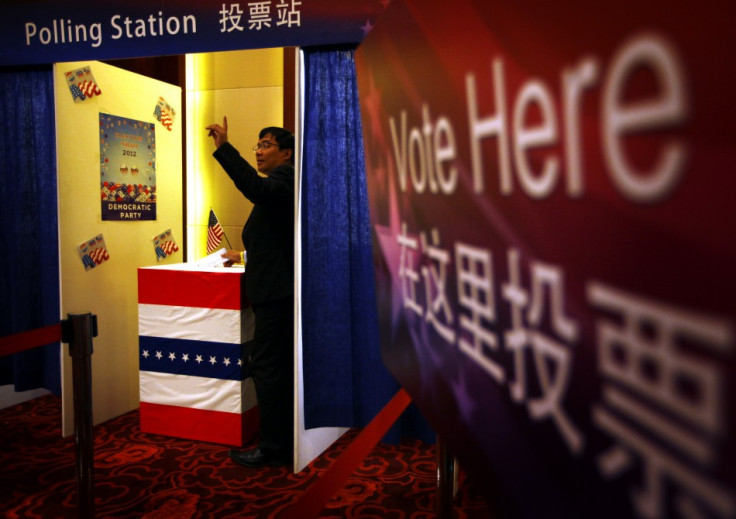Obama Wins US Election 2012: What Next For China-US Relations?
China expert Jonathan Fenby takes a look at what's in store for US and China relations as Obama is re-elected as US President.

China will have welcomed the outcome of the US presidential election, albeit without great enthusiasm. Beijing has grown accustomed to President Obama and believes it knows how to handle him. That is preferable to the unknown Mitt Romney, with his threat to declare China a 'currency manipulator' on his first day in office (even if the practicality of doing so was always open to doubt).
Though friction will continue over trade, and the export of American jobs in manufacturing to the People's Republic, an informal modus vivendi has been reached with Washington on the previous flashpoint of the value of the Chinese currency. Beijing's holdings of US assets in its foreign exchange reserves tie the two countries together - America needs the money and the PRC cannot start to sell off assets for fear of provoking a run on the greenback that would slash the value of its remaining holdings.
America still wants China's help over North Korea and hopes that it will play a more constructive role over issues such as Syria.
China, meanwhile, would like greater access for investments in technology companies in the USA. So there is plenty of room for some imaginative diplomacy between the two superpowers even if they are likely to remain wary of one another.
Overall, Beijing has come to regard Obama as a leader who acts rationally and whom they do not need to fear while their evaluation of his country is that, for all its remaining strengths, it is in relative decline. So, with another four years of his presidency ahead, they can focus on what concerns them most, domestic policy.
Romney, on the other hand, would have been a potentially a more dangerous president as far as China was concerned. It is true that presidents including Bill Clinton and George W. Bush who came to office declaring their readiness to confront the PRC ended up taking a more conciliatory tone. It is also the case that Chinese leaders dating back to Mao Zedong have generally preferred Republicans to Democrats.
But, while Beijing did not express any official preference between the two candidates, there were unofficial indications that China was worried Romney might live up to his campaign rhetoric and unleash a process that could have led to a trade war which would have benefitted neither country. The protectionism might not have proved simply a campaign gimmick. One of the songs played at his rallies proclaimed, after all:
'I want the label on my shirt to say
This was made in the USA'
Though Obama will be under heavy pressure to boost job numbers, and there will be clashes over individual products, the worry of an outright broad trade conflict can now be put on the back burner - a relief to a regime which needs maximum stability in which to work through the rebalancing of its own economy as growth declines and social tensions rise.
The main danger point may arise from the regional strategic position in East Asia where China is at loggerheads with its neighbours. While the immediate confrontations are with Japan, Vietnam and the Philippines, the shadow of the US looms in the background.
Since 1945, American naval and air power, plus the presence of troops on the soil of Asian allies - and, most recently in Australia - have given the region its strategic security umbrella. As China modernises its armed forces, most recently by bringing its first aircraft carrier into service, the prospect of a trial of strength with the US may well arise. This does not mean outright warfare since China would be at a great disadvantage given America's military superiority. But it could bring an edgy climate to a region which is increasingly important for the global economy, and where China and the US are set to promote rival free trade zones that could oblige Asian countries to make an unwanted choice between the two of them.
Obama's proclamation last year of an 'Asian pivot' by his country may work militarily but in economic terms it will be hard for the US to supplant China. Even as staunch an American ally as Japan would have trouble joining a free trade zone that would hit its politically powerful farmers while excluding mainland China whose manufacturing capacity contributes powerfully to the profits of major firms and whose consumers remain a big long-term target market if political tensions can be assuaged.
Formulations such as 'ChinAmerica'and the'G2' of the US and People's Republic have lost their sheen. The reality is that both countries have major domestic issues to resolve. They are bound to clash on specific international issues. America will remain leery of high-tech piracy by China and China will feel unfairly treated. America will criticise China's human rights record and China will tell it to get lost. American companies will fret about being discriminated against in China and suffering from weak enforcement of intellectual property rights there, but the Chinese will reply that they need the mainland market in an era of soggy demand in the West.
The two countries will thus rub along with occasional flashpoints and Congressional resolutions calling for raised tariffs on Chinese goods. But Obama's re-election provides a measure of certainty, and China knows that it is all it can expect.
Jonathan Fenby has just published a wide-ranging account of contemporary China entitled Tiger Head, Snake Tails; China Today. He is China director for the emerging markets research service Trusted Sources, and blogs On China.
© Copyright IBTimes 2025. All rights reserved.





















